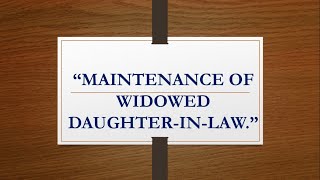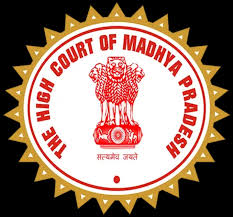Rakesh Kumar Garg, J.@mdashThis is defendant''s second appeal challenging the judgment and decree of the Lower Appellate Court whereby suit of the plaintiffrespondents for declaration has been decreed and they have been awarded maintenance of Rs. 600/- per month each from the appellant from the date of institution of the suit.
2. Brief facts of this case as emerged from the plaint are that respondent No. 1 was married with Leela Krishan son of the appellant. Respondent No. 2 was born out of the said wedlock. About 1 1/2 years earlier from the filing of the suit, Leela Krishan, husband of respondent No. 1 and father of respondent No. 2 died and thereafter, they were turned out of their residential home by the appellant. The Istridhan of respondent No. 1 was also not returned by the appellant. The respondents had no source of income. It was further pleaded that the appellant, who had retired from FCI Department, had received the retiral benefits of Rs. 25,00,000/- and was drawing the pension of Rs. 8,000/- per month and was having additional monthly income of Rs. 50,000/-. The respondents, who were unable to maintain themselves, were entitled to the maintenance of Rs. 6000/- per month each from the appellant. Hence, the suit.
3. Upon notice, the appellant appeared and contested the suit raising various legal objections in the written statement. It was alleged that the appellant had no coparcenary property in his possession and he was drawing pension of Rs. 3760/- per month since July, 2007. It was further submitted that the aforesaid pension was insufficient even for his own livelihood. The relationship of respondents No. 1 and 2 was admitted. It was denied that the respondents were turned out of the residential house by the appellant and it was alleged that respondent No. 1 had gone to the house of her parents along with respondent No. 2 at her own accord. It was denied that respondent No. 1 was having no source of income and it was further alleged that she was doing the labour work and was earning of Rs. 5,000/- per month approximately. Remaining facts of the plaint were denied and dismissal of the suit was prayed for.
4. From the pleadings of the parties, the following issues were framed by the trial Court:
1. Whether the plaintiffs are entitled to the maintenance allowance from the defendant, if so its effect? OPP
2. Whether their maintenance allowance is liable to be declared a charge on the pensionary benefit and other retiral benefits of the defendant as alleged?
3. Whether the suit is not maintainable? OPD
4. Whether the plaintiffs have no locus standi to file the present suit? OPD
5. Whether the suit is bad for non-joinder and mis-joinder of necessary parties? OPD
6. Relief.
5. Both the parties were given opportunity to lead evidence in support of their rival contentions. After hearing both the parties and analyzing the evidence on record, the trial Court dismissed the suit with costs vide judgment and decree dated 10.12.2008.
6. Feeling aggrieved with the impugned judgment and decree of the trial Court, the respondents filed an appeal before the Lower Appellate Court which was accepted vide impugned judgment and decree dated 15.3.2010 holding that the respondents were entitled to a sum of Rs. 600/- per month each as maintenance from the appellant from the date of institution of the suit. While allowing the appeal, the Lower Appellate Court observed as under:
Now coming to the facts of the present case, defendant while appearing as PW3 admitted that he was having house at village Kotli, which was sold by him though he tried to clarify that same was sold by his nephew. Once the defendant admitted that he had ancestral house, which has been sold, it was required for him to show as to by whom the same was sold and he had not received any penny there from. He also admitted that he has a residential house at Barwala but stated that the same was given by his in-laws. He did not establish as to where from he derived title of the house at Barwala where he is residing. If his son Leela Krishan had been alive then he would have got share in ancestral house at Kotli and also of the house of defendant at Barwala. The plaintiff No. 1 did not get any share from the sale pursuits of house at Kotli and from the house in possession of defendant at Barwala. He is also receiving Rs. 4204/- per month net since 1.3.07 as basic pension of Rs. 3695/-. DW2 Ved Parkash Accounts Assistant DM Office, stated in his cross-examination that as per record the defendant had received gratuity of Rs. 1,76,838/- and leave encashment of Rs. 52,209/-. He had received substantial amount and is also receiving pension. Whereas his grand daughter Divya is leading life of starvation after death of his father Leela Krishan. The plaintiffs were ousted from the house of defendant. Learned trial Court misread the evidence that the plaintiffs were residing with her parents since last 7-8 years, which is in fact 7-8 months. It is admitted by defendant that at the time of death of his son Leela Krishan, the plaintiffs were residing with him. As observed by our own Hon''ble High Court, widowed daughter in law is entitled to get maintenance from her father in law as held in Balbir Kaur''s case (supra) and further grand children are entitled to claim maintenance from grandfather, if their parents are not having sufficient income in view of law laid down in Nachhattar Singh''s case (supra), so the plaintiffs are entitled to get maintenance from the defendants. Deposition of DW1 Dr. Pooja Bhutani only stated that wife of defendant was an OPD patient for weakness and given medicines for 10 days and would not help the case of defendant. In view of the fact that the defendant is having a residential house and receiving net pension amount of Rs. 4200/- which must have increased after recommendations of 6th pay commission, so maintenance amount of Rs. 600/- per month to each of the plaintiffs would meet the ends of justice. Accordingly, issue No. 1 is answered in favour of the plaintiffs. Learned trial Court erred while declining relief of maintenance to the plaintiffs. The findings of the trial Court on issue No. 1 are set aside. However, the maintenance allowance to the tune of Rs. 600/- each to the plaintiffs shall not be declared as charge on pensionary benefits and other retiral benefits of the defendant. The suit of the plaintiffs is perfectly maintainable and plaintiffs have locus standi to file the present suit. All the necessary parties have been impleaded. The plaintiffs shall be entitled to claim maintenance amount of Rs. 600/- each per month from the date of institution of the suit from the defendant.
7. Not satisfied with the aforesaid judgment and decree of the Lower Appellate Court, the defendant-appellant has filed the present appeal.
8. Learned Counsel for the appellant has vehemently argued that the widowed daughter-in-law had no right to claim maintenance from the appellant against his self acquired property and the application for maintenance of widowed daughter-in-law can be made from the properties of which the husband was a co-sharer and not otherwise. In support of his case, learned Counsel for the appellant has relied upon a judgment of the Bombay High Court in the case of Venubai and Ors. v. Laxman Lahanuji Rambhad and Ors. 2008 (4) RCR (Civil) 664 and the Hon''ble Supreme Court in the case of
1. Whether the plaintiff/respondent is entitled for maintenance from her father-in-law/appellant, when the appellant is not in possession of any kind of coparcenary property?
2. Whether the respondents are entitled for maintenance from the appellant, as per the provisions of Section 19(2) of Hindu Adoption and Maintenance Act, 1956?
3. Whether the respondents are entitled for maintenance from the appellant, from his self acquired property?
4. Whether the judgment and decree of the ld. First Appellate Court is based upon misreading and misinterpreting the evidence on record?
9. I have heard learned Counsel for the appellant and perused the impugned judgment and decree of the Lower Appellate Court.
10. It is not in dispute that a widowed daughter-in-law can claim the maintenance from her father in law if she was unable to maintain herself out of her own earnings or other properties and was unable to maintain herself from the estate of her husband or from the estate of her father or mother or from her son or daughter, if any, of his or her estate. Similarly, a grand daughter is also entitled to maintenance under the provisions of the Hindu Adoption and Maintenance Act, 1956. However, the argument raised before this Court is that a widowed daughter-in-law can claim maintenance from her father-in-law only if he has inherited the property of her husband and not from self acquired property of her fatherin- law. The judgment of the Hon''ble Supreme Court in Vimalben Ajitbhai Patel''s case (supra) relied upon by the appellant is not applicable as in that case, the right to maintenance of wife was sought to be enforced against the property of mother-in-law during the life time of the husband.
11. It may be pointed out that in Nachhattar Singh v. Satinder Kaur and Ors. 2007 (4) RCR (Civil) 826 this Court has held that the grandfather is liable to maintain grand- children if income of their parents is inadequate for their maintenance. Similarly, in Balbir Kaur v. Harinder Kaur 2003 (1) RCR 624 this Court held that the widowed daughter-in-law of a pre-deceased son is entitled to claim right of maintenance against the self-acquired property of her father-in-law.
12. Thus, keeping in view the aforesaid law laid down by this Court in the aforesaid judgments, no fault can be found with the findings of the Lower Appellate Court holding that the respondents can claim maintenance from the appellant.
13. Moreover, it is relevant to point out here that while allowing the appeal, the Lower Appellate Court has observed that the appellant while appearing in the witness box as PW-3, admitted that he was having the ancestral house which was sold by him, though, he tried to clarify that same was sold by his nephew. Once the appellant admitted that he had ancestral house which was sold, it was for him to show that he had not received any money therefrom. It is not in dispute that if Leela Krishan, husband of respondent No. 1, had been alive then he would have got share in the ancestral house situated at village Kotli. It is not the case of the appellant that the respondents got any share from the sale proceedings of house at Kotli.
14. Admittedly, the appellant is receiving pension and has also received benefits of gratuity and leave encashment whereas respondent No. 2, who is grand daughter, is leading a life of starvation. Even the respondents were ousted from the house of the appellant. Thus, in these circumstances, the respondents were rightly held entitled to the maintenance as awarded by the Lower Appellate Court.
15. No other point was urged.
16. Thus, no substantial question of law arises in this appeal.
17. Dismissed.

